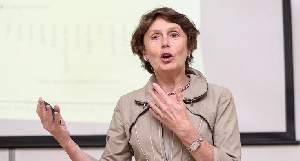The International Monetary Fund (IMF) and private sector players have lauded government’s efforts in steering the affairs of the Ghanaian economy from 2017 till now.
They however urged government to sustain the gains made.
Fiscal deficit dropped from 9.0 percent of GDP in 2016 to 6.0 percent of GDP in 2017, inflation has hit single digit in April 2018, interest rates have been trending downwards with 91-day Treasury Bill at 13.34 percent, Ghana’s economy is one of the strongest in Sub Saharan Africa whilst the cedi has been relatively stable against the US dollar in 2018.
Country Manager of the IMF, Dr Natalia Koliadina, said she was confident the economy would remain robust if macroeconomic fundamentals were sustained.
“Let me congratulate the government for a successful 2017 in terms of restoring macroeconomic stability. The fiscal deficit was reduced from 9.3 percent of GDP in 2016 to 6.0 percent of GDP in 2017 and this is an enormous effort,” she indicated.
“Last year was the first time the government was able to record primary (trade) surplus, debt to GDP ratio is also on the declining path…this is a major achievement at least it did not come at a zero cost it had an impact on the economy, at the same time the economy was growing at a very robust rate and one of the highest in Sub Saharan Africa and the world,” Dr Koliadina stated.
The focus, the IMF rep said was making sure that macroeconomic stability continued and was maintained into the future.
IMF in support of Ghana Beyond Aid Agenda
Dr Koliadina expressed the Fund’s supports the government policy objectivity of ‘Ghana beyond Aid’ which she believes when done will sustain macroeconomic stability and achieve higher economic growth.
She however called for a sustained strategy that will trigger more revenue generation to keep the fiscal deficit down whilst government undertakes its priority projects.
Industry hails achievements
Chairman of Fidelity Bank Ghana, Edward Effah, for his part said the government must be applauded for improving many of the indicators for measuring ‘Ease of Doing Business Report’ by the World Bank including cost of electricity, access to credit, infrastructure among others.
“I expect to see that over the next year or two Ghana’s ranking when it comes to the ease of Doing Business will improve significantly. The World Bank uses a number of indices from access to credit, interest rates, infrastructure, cost of electricity, property rights and all of them. I think we need to commend the government…. we’ve seen significant improvement in many of those areas over the last 18 months.”
He emphasized that investor confidence has soared, adding “we were at the Eurobond road show and there were a lot of investor confidence in the Ghanaian economy and that was different from Ghana two years ago where investors saw Ghana as a disaster.
Explaining further, Mr. Effah said “what impressed investors were that growth has gone from 3.5 percent to 8.9 percent and inflation is now single digit, the currency was the worst performing currency in 2014 with devaluation of about 35 percent but in 2018 is one of the best performing currencies, our international reserve is more than 4 months of import cover and is one of the highest, interest rates are coming down, so all these factors go to help in the ease of doing business.”
Mr. Effah also called on Ghanaians to support the Ghana Beyond Aid policy, saying it is noble. “We need to build a solid private sector. We need big Ghanaian companies to pay taxes and create more jobs.
Some other private sector players that spoke with Business Finder also commended government for the introduction of the digital address system, reduction in cost of electricity tariff, reduction in bank lending rates, mobile interoperability among others, adding that will enhance the business environment further.
The summit adopted Panels, Plenary Sessions, Deal Rooms and Open For a for lively and thought-provoking discussions.
Business News of Thursday, 24 May 2018
Source: thefinderonline.com

















